|
RIPSTER REVIVALS #13
An irritatingly frequent 'occasional' column of ramblings around the world of (mostly) crime fiction and thrillers. Books read, re-read and still to be read.
|
Birthday Re-Read
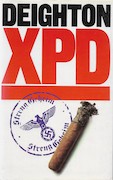 On the occasion of his 96th birthday, I decided to re-read Len Deighton’s XPD which admittedly was not much of a birthday present for him (though I did send him a card), but I enjoyed reacquainting myself with a book I enjoyed when it was first published in 1981.
On the occasion of his 96th birthday, I decided to re-read Len Deighton’s XPD which admittedly was not much of a birthday present for him (though I did send him a card), but I enjoyed reacquainting myself with a book I enjoyed when it was first published in 1981.
I had totally forgotten, and was slightly shocked to read, the line East Anglia is the lost continent of Great Britain, especially as 2025 marks fifty years of my residency in the eastern marches and immediately got in touch with the author to protest that most East Anglians, native or adopted, are quite happy to remain quietly “lost” from the rest of the country, though most would be happy if the region’s national politicians – Farage, Lowe, Truss, Hancock etc. – actually did get lost. Len replied ‘I am on your side’ which is a very apt thought to keep in mind whilst reading XPD (which stands for “Expedient Demise”), a conspiracy thriller which flits between Switzerland, Hollywood, London and, briefly but violently, East Anglia with flashbacks to World War II, as British, American and Russian spies, as well as crooks, dodgy film producers and ex-Nazis, race to find the “Hitler Minutes” – the supposed record of a meeting between Hitler and Churchill in 1940. And all this against the background of the making of a film about the discovery (and theft?) of a hoard of Nazi plunder found in a German mine in 1945.
Swinging Sixties?
One of the first American paperbacks I ever bought, sometime in the mid-Sixties, was the Fawcett Gold Medal edition of Donald Hamilton’s The Silencers. Imported paperbacks were rare things back then, but Hamilton’s thrillers featuring secret agent Matt Helm (with the uninspiring code name ‘Eric’) were suddenly available thanks to the release of a pair of films starring, with tongue firmly in a glass of bourbon, Dean Martin as an American James Bond.
The Matt Helm character is probably best known to younger readers from The Wrecking Crew, the film-within-a-film in Quentin Tarantino’s epic Once Upon A Time In Hollywood and I think all the Matt Helm novels were reissued in the UK by Titan in 2013, but I still feel nostalgic when I come across that Fawcett livery.
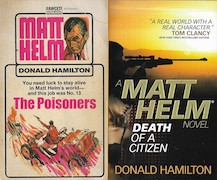
Naturally I was excited to find, buried deep in my To-Be-Read pile, The Poisoners, an adventure at the midpoint of the series (#13 of 27) from 1971, although I have no idea when or where I acquired it.
The Poisoners has all the trademarks of the classic ‘spy fantasy’ thriller which boomed in the 1960s with some unusual twists. Helm is highly critical of environmental conditions in Los Angeles, from polluted water to unbreathable air, even citing fringe groups who advocate (outrageously) the banning of the internal combustion engine, and this concern eventually forms a key part of the plot, though not before our secret agent hero seeks revenge for the death of a female colleague and manages to bust a drug-smuggling operation. (The local Mafia, incidentally, are opposed to drugs as bad public relations for their mainstream businesses of gambling and prostitution.)
Along the way, Helm displays a comprehensive knowledge of lethal weaponry and there’s a description (the first?) of a laser-guided telescopic rifle sight. He is also pretty ruthless in deploying death and destruction to both humans (including females) and vehicles as the action zips to-and-fro across the Mexican border. And being a super spy in the Swinging Sixties he is required to be interested in all things alcoholic, though it is one of the femmes fatales in the book who gets the best lines when disparaging touristy fads: “Margaritas were bad enough when they were a quaint local drink; now that they’ve become a national tourist industry, to hell with them...Let the quaint local bastards keep their quaint local salt-rimmed glasses. Just see if you can promote me a nice vodka martini...”
Would that be shaken or stirred, Mr Bond? Sorry, Helm.
Donald Hamilton (1916-2006) was a contemporary of British novelist and comic-strip writer Peter O’Donnell (1920-2010) who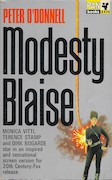 also created one of the iconic fictional agents of the Sixties, Modesty Blaise.
also created one of the iconic fictional agents of the Sixties, Modesty Blaise.
And here it is time for a confession. In my history of the golden age of British thrillers, Kiss Kiss Bang Bang (which I might have mentioned in the past), I feel I may have short-changed the significance of the novel Modesty Blaise which was published in 1965, although the character had featured in a comic strip from 1963 and was the basis (very loosely) for the bizarre Joseph Losey film of 1966. I certainly remember the excitement at the time that a ‘female James Bond’ might have been created but somehow Modesty Blaise did not fit the bill for me, perhaps because I was a dedicated fan of Diana Rigg as Emma Peel in The Avengers and had discovered the ‘sexually precocious’ Anna Zordan in the short-lived and now forgotten thriller series written by James Eastwood.
I was probably guilty of youthful snobbery about the character’s origins in a newspaper comic strip which, apart from Andy Capp, was a medium that had totally escaped me. My neglect of Modesty was brought to my attention shortly after the publication of Kiss Kiss Bang Bang in 2017 by a pitchfork-wielding mob of her fans – well, three of them actually, but they know where I live – and so I promised to give the novel a second chance. Eventually I’ve got round to it and to prove my good intentions, I have another one, The Xanadu Talisman, which I have bumped up my TBR pile.
Modesty is not a super-spy, rather a super-criminal now retired from international thievery but easily tempted back into action to help British Intelligence thwart the plans of criminal mastermind Gabriel to steal a ship load of diamonds. With the aid of her sidekick Willie Garvin and an extensive armoury of gadgets secreted about their persons and within the scaffolding of Modesty’s bra, the pair track the evil Gabriel through the Suez canal, participate in the underwater heist of the diamonds (shades of Thunderball here?) and triumph in the inevitable shoot-out in a Greek island monastery.
Modesty Blaise the novel (I cannot speak of the comic strip and of the film I will not) is an above-average example of the ‘spy-fantasy’ story (as opposed to the more realistic school of Deighton and Le Carré) which flooded the market in the wake of the Bond films and their imitators in that swinging decade.
It was a decade when so much changed, not the least of which was female fashion and especially female hosiery. This clearly proved a challenge for both Peter O’Donnell and Donald Hamilton, as both authors devoted time and space to describing a startling innovation.
As Modesty Blaise undresses for a bath: ...she wore a black bra and pantie-stockings, no girdle or suspenders. She had a dislike for straps, buckles, anything that confined, and for this reason the long nylon stockings were of one piece with the pants, in the style of theatrical tights.
Six years later in The Poisoners, Donald Hamilton also felt he had to explain this phenomenon as Matt Helm observes one of the (several) women he encounters lying on a bed, her skirt having ridden up: ...to reveal an interesting sartorial detail: the currently somewhat untidy stockings weren’t separate stockings at all, but integral parts of an all-in-one nylon garment, sheer below and only slightly more opaque above, apparently designed to render obsolete such old-fashioned undercover engineering items as garters and girdles.
Who says popular thriller writers never tackled the burning issues of the day?
Wartime University Challenge
In previous ramblings I have recounted how, almost forty years ago, the late George Thaw, then books editor of the Daily Mirror, spotted a gap in the market for crime novels set during World War II. It was a gap which began to be filled by John Gardner with Bottled Spider in 2002 and currently seems to be flourishing with a clutch of new titles over the next few months, all based (coincidentally) in noted university cities.
To begin, naturally, with Cambridge, The Cambridge Siren [Allison & Busby] is the fourth outing for Jim Kelly’s (first) war damaged detective Eden Brooke as he tackles crime and disorder in Cambridge in 1941 during the second war, and there’s plenty of both to go around. Apart from the continuing themes of ‘nighthawks’ and ‘night climbers’ who populated Cambridge after dark, the novel gives Inspector Brooke multiple cases to solve: three bodies of young men found in public air raid shelters, a well-organised greyhound racing scam, an even more disturbing conspiracy to avoid call-up into the services and the possibility of sabotage taking place in a Cambridge factory producing lenses for submarine periscopes.
It's all go for the decent, sympathetic Inspector Brooke who sticks to his multi-tasking with great determination, only pausing to sample the occasional pint of Ridleys Best Bitter. This was a fine beer I enjoyed regularly (though never in Cambridge) before the Essex brewery closed and I was not alone in mourning the loss of their excellent Stock Ale. Jim Kelly insists that a pint of Ridleys in 1941 cost “five pence” when it would be more accurate historically to say a shilling. {For the younger reader, there were twelve old pennies in a pre-decimal shilling.} To be completely pedantic, the price of a pint in mid-1941 was probably 10d (ten old pennies) and it went up to 1/- (a shilling – see, I remember how to do it) and more after the 1942 War Budget duty increase. [Source: The Brewers Society].


About Oxford I can say little other than that Murder In Oxford [Allison & Busby in May] by Christina Koning is set in 1942 and is the ninth book in a series featuring blind detective Frederick Rowlands, like Jim Kelly’s Eden Brooke a victim of WWI caught up in WWII. A tenth book in the series is due later this year and earlier books appeared under different titles and as by A. C. Koning.
In April, the prolific history-mystery author Chris Nickson updates his period setting to 1941 but does not abandon his beloved Leeds. No Precious Truth [Severn House] is the first in a projected series featuring Detective Sergeant Cathy Marsden who is called in by the security services to help track down a German double (or possibly treble) agent.
In May, Mark Ellis’ well-established Anglo-Spanish detective DCI Frank Merlin returns in Death of An Officer [Headline Accent]. Merlin’s beat is a bomb-scarred London in 1943 and the brutal murder of a respected doctor in Kensington is only the first death in a case which involves Maltese gangsters, rent boys, MI5 and some senior Allied officers.

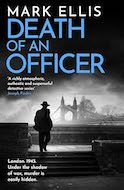
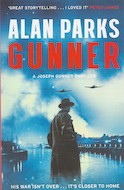
And I admit I am greatly looking forward to July and a new venture by Scot Alan Parks, whose tartan is of the most noirish hue. Gunner [Baskerville] is set in Glasgow, Parks’ usual stomping ground, but this is the Glasgow of March 1941 and former detective Joseph Gunner, wounded in the battle for France, is hauled back into police service to help identify a body (which turns out to be German) found during a Luftwaffe bombing raid. Given Alan Parks’ track record with his superb Harry McCoy thrillers, I expect this to be a hard-as-nails look at hard-as-nails characters in a wartime Glasgow and given the location and the date, don’t be surprised if Rudolph Hess puts in a fleeting appearance.
Cold Water Reading
How do you know if someone is a cold water swimmer? They bloody well tell you. I on the other hand was something of a cold water reader, as there was a time in my long distant youth when I gravitated to thrillers set in the icy wastes of the Arctic and, occasionally, Antarctica.
water reader, as there was a time in my long distant youth when I gravitated to thrillers set in the icy wastes of the Arctic and, occasionally, Antarctica.
Anticipating the final Crimefest in Bristol in May and the opportunity to meet former CWA chair Tom Harper, I thought it only polite to read one of his best-selling novels which had somehow passed me by. I was delighted to discover that one title in his impressive backlist seemed to fill the criteria of my youthful addiction to cold water reading, his 2014 thriller Zodiac Station. It may not be typical of Harper’s work – he is best known for historical novels and his Wilbur Smith ‘continuations’ – but it seems likely to press all my young reader buttons as a US Coast Guard icebreaker ploughing through Arctic pack ice spots a lone skier trudging towards them out of the freezing nowhere. He is, he says, the survivor of the disaster at Zodiac, a scientific research station on the remote Utgard Island and his story as it unfolds, if it can be believed, suggests dangers not limited to the weather, the temperatures and the odd polar bear.
I was so enthused that I raided my limited, but precious, collection of first editions to dig out two of my most cherished past reads set in frozen climes, Alistair MacLean’s Night Without End from 1960 and my old friend Philip Purser’s 1962 debut Peregrination 22, to see how the younger generation of ‘chiller’ writers compare.
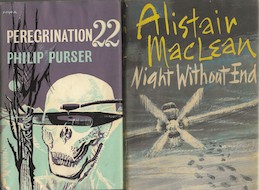
From the To-Be-Read Pile
One of the great joys of a TBR pile is discovering a title by a much-admired author that has somehow slipped through one’s reading net.
I became a fan of Adam Hall’s ‘Quiller’ books from when the first, The Quiller Memorandum, appeared in paperback in 1967. I devoured the next four titles in the series but then I went off to university and got sidetracked. Much later, I had the pleasure of editing new editions of two of those early Quillers – The Ninth Directive and The Striker Portfolio – for the Top Notch Thrillers imprint and was delighted to find that both held up superbly well, forty years on.
I have in recent years caught up on my Quiller intake, though I have by no means read all 19 novels featuring the always under pressure super-secret agent, but I am on my way having discovered a copy of Northlight - #11 in the series if anyone is counting – from 1985. A nuclear submarine in crisis in Arctic waters, Quiller undercover - alone and unarmed as always – in enemy territory...it’s already bringing back comforting memories.
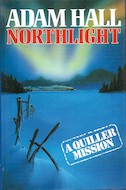
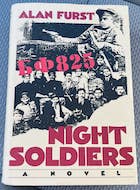
Last time I recorded similar delight at discovering an Alan Furst novel, Night Soldiers, which I had not read until now. It is, incidentally, quite brilliant, and my fondness for the title has increased as I have discovered the cover of what I think is the American first edition (sadly not in my collection), which illustrates the story perfectly.
On The Add-To List
It’s never too early to point out an upcoming title when it’s of particular interest; and one of mine.
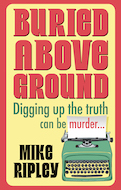
Buried Above Ground is published by Severn House in September and is something of a departure for me, possibly best described as a crime novel written by someone who has read too many crime novels. It also comes, uniquely I think, with a crib sheet to some of the crime novels referred to. Well, if some writers can be allowed a ‘Play List’ to brag about their wide ranging taste in music, I reckon I’m allowed to brag about the depth of my crime fiction library.
The Chandler Protocol
I have always been guided by the sentiment of Raymond Chandler as expressed in a letter to Jamie Hamilton, his British publisher in 1951:
Publishers may apologize to authors and to
other publishers and to other writers. But with
agents it is enough that you let them live.
I am, however, prepared to make an exception for veteran agent Peter Buckman who has returned to the novel after a brief hiatus as a publisher, a non-fiction author and a television scriptwriter, with the first in a projected series of cosy crime stories by-lined the Pumpernickel Mysteries.
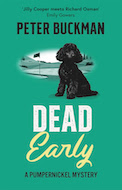
Pumpernickel is a black poodle belonging to Soho solicitor Leo Wengrowski, still active (in more ways than one) and working beyond retirement age, and so doesn’t get too many of the really good lines handed out by Buckman. In particular, I like the world view of Dennis Arbuthnot the self-styled ‘world’s most fearless reporter’ who, when told of the numerous additives listed on the label of the wine he is quaffing, he retorts: Which is precisely why I don’t read them. There is enough bad fiction in the world without adding wine labels.
Dead Early [Word of Mouth Books], which is great fun, begins with a suspicious suicide pact and a fatal shooting, all of which involves members of a local Golf Club. As Mr Pink in Reservoir Dogs might have said: so, no real people then?
Toodles,
The Ripster.